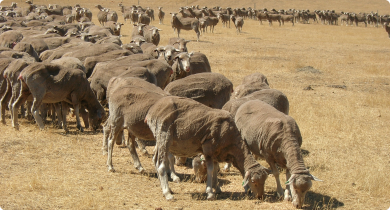Stockfeed
The Department of Primary Industries and Regional Development regulates stockfeed to safeguard animal and public health and maintain export markets for Western Australia’s livestock produce.
If livestock consume unsuitable feed it may cause sickness or death in livestock and may make their meat, milk and eggs unsuitable for human consumption.
The regulations for stockfeed cover the following areas:
Standards for stockfeed
Certain substances, such as chemicals, medications and heavy metals, must not be present in stockfeed, or must not be present at harmful levels.
Stockfeed labeling
Stockfeed must be correctly labeled to reduce the risk of livestock being fed unsuitable feed.
Feeding restrictions for ruminant animals – the ruminant feed ban
It is illegal to feed any meat products, such as meat meal, to ruminant animals. This feed ban is in place to minimise the risk of bovine spongiform encephalopathy (BSE or mad cow disease) occurring in Australia. Ruminants include cattle, sheep, goats, deer, alpacas and llamas.
Feeding restrictions for pigs – the swill feeding ban
Feeding food scraps (also known as swill) to pigs is illegal in Australia because it could result in the introduction of devastating diseases to pigs and other animals.
Articles
Filter by search
Filter by topic
- (-) Remove Feeding & nutrition filter Feeding & nutrition
- (-) Remove Livestock biosecurity filter Livestock biosecurity
- Biosecurity & quarantine (4) Apply Biosecurity & quarantine filter
- (-) Remove Biosecurity filter Biosecurity
- Pests, weeds & diseases (1) Apply Pests, weeds & diseases filter
- Pigs (1) Apply Pigs filter
- Livestock species (1) Apply Livestock species filter
- Diseases (1) Apply Diseases filter
- Livestock disease surveillance (1) Apply Livestock disease surveillance filter
- Livestock health & diseases (1) Apply Livestock health & diseases filter



